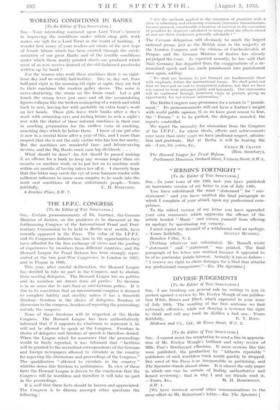THE I.P.P.C. CONGRESS [To the Editor of THE SPECTATOR.]
S ia,—Certain, pronouncements of Dr. Gurtner, the German Minister of Justice, on the problems to be discussed at the forthcoming Congress of the International Penal and Peni- tentiary Commission to be held in Berlin next month, have recently appeared in the Press. The value of the I.P.P.C. and its Congresses hitherto has lain in the opportunities they have afforded for the free exchange of views and the pooling of experiences by members from different countries, and the Howard League for Penal Reform has been strongly repre- sented at the two post-War Congresses, in London in 1925, and in Prague in 1930. •
This year, after careful deliberation, the Howard League has decided to take no part in the Congress and to abstain from sending delegates. The Howard League has no politics and its members are drawn from all parties. Its decision is in no sense due to anti-Nazi or anti-German policy. It is due to. its conviction that an. international congress is doomed to complete futility and sterility unless it has a threefold freedom—freedom in the choice of delegates, freedom of discussion in the congress, freedom of reporting the proceedings outside the congress.
• None of these freedoms will be respected at the Berlin Congress. The Howard League has been authoritatively' informed that if it appoints its Chairman to represent it, he will not be allowed to speak at the Congress. Freedom in choice of delegates and freedom of speech is therefore denied. When the League asked for assurance that the proceedings would be freely reported, it was informed that " facilities will be granted to the accredited correspondents of the German, and foreign 'newspapers allowed to circulate in the country; for reporting the discussions and proceedings of the Congress.", The qualification " allowed to circulate in the country ", whittles down this freedom to nothingness. In view of these facts the Howard League is driven to the conclusion that the Congress will be worthless and therefore it will take no part in the proceedings.
. It is well that these facts should be known and appreciated. The Congress is to discuss. amongst other questions the following :
‘.‘ Are the methods applied in the execution of penalties with a view to educating and reforming criminals (intensive humanization, favours granted, considerable relaxation of coercion in the execution of penalties by degrees) calculated to bring about the effects aimed at and are these tendencies generally advisable I "
The Cerman delegation will obviously be much the largest national group, just as the British were in the majority at the London Congress and the citizens of Czechoslovakia at Prague, and the German Minister of Justice has. already prejudged the issue. As reported recently, he has said that Nazi Germany has departed from the exaggerations of a de- moralized epoch and has made punishment into punishment once again, adding:
"We shall not. hesitate to put forward our fundamental ideas with, emphasis, before the international forum. We shall point out that we have put an end to exaggerated softness, but that we have not ceased to treat prisoners justly and humanely. Our statements ivill be confirmed through numerous visits to prisons, giving an opportunity for eye-witness information."
The Berlin Congress may pronounce for a return to " punish- ment." Its pronouncements will not have a feather's weight with world public opinion, if, as we have good reason to fear, the " Forum" is to be packed, the delegates muzzled, the reports controlled.
We regret the necessity for abstention from the Congress of the I.P.P.C., for whose ideals, efforts and achievements over more than sixty years we have profound respect, admira- tion and gratitude. But at Berlin it will be beating the The Howard League for Penal Reform, (Hon. Secretary). Parliament Mansions, Orchard Street, Victoria Street, S.W






































 Previous page
Previous page